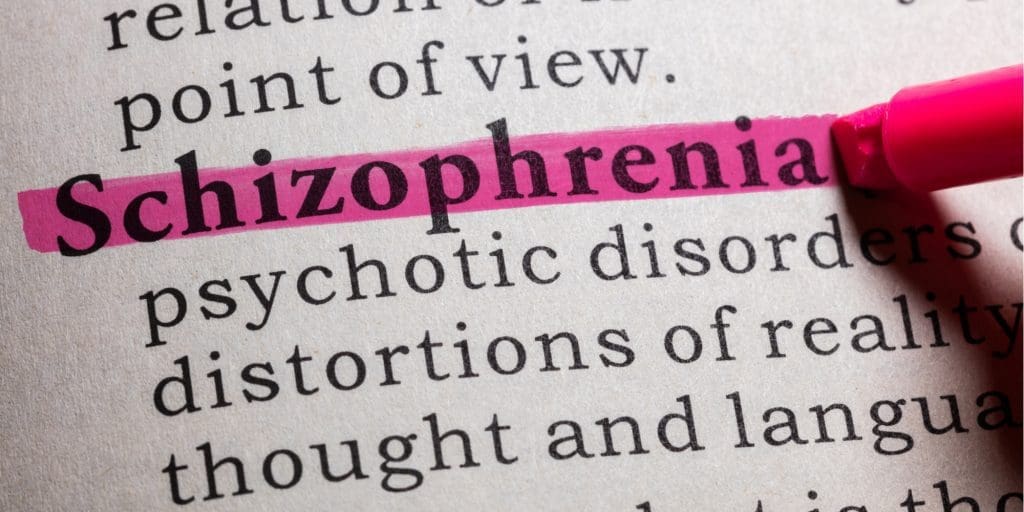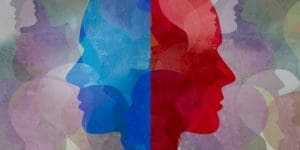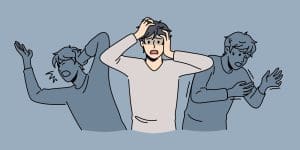For many people, there is a vague understanding of what a mental health condition is, but they may be unable to name specific diagnoses. For others, they may be able to name depression or anxiety, but struggle to recognize other mental health disorders. To help spread information about mental health and different types of conditions, we’ve compiled a mental illness list of the most common psychological disorders.
Keep reading for a review of the most common types of mental illness and what individuals can expect from mental health treatment.
Contents
1. Depressive Disorders

If you’ve heard of any mental health condition, it was probably this one. Across the globe, more than 264 million individuals live with depression. And while symptoms can range in severity, in many cases they create serious hurdles that make daily living much harder.
Some of the most common depression symptoms include:
- Lack of energy
- Loss of interest in activities that one used to enjoy
- Feelings of intense sadness that persist even in positive situations
- Reduced appetite
- Frequent thoughts of death or suicide
While these symptoms can feel debilitating, the good news is that depression is entirely treatable. It cannot be cured in all instances, but therapeutic treatments can help individuals develop coping skills and behavioral habits that minimize symptoms and make them easier to deal with.
While most cases of depression can be treated on an outpatient basis, they may sometimes require inpatient mental health treatment. This is usually the case for people who try counseling for depression but do not see results. Moreover, crisis stabilization care may be necessary for an individual who is actively considering suicide, and this level of care may act as a precursor to more comprehensive mental health care.
2. Anxiety Disorders
Anxiety disorders are among the most common mental illnesses, with 40 million American adults living with some form of anxiety. Anxiety is categorized as a mood disorder, meaning it typically has a profound effect on mood and disposition. Some of the most common anxiety symptoms are:
- Trouble sleeping
- Increased heart rate
- Feelings of chronic nervousness or stress
- Gas, constipation, or diarrhea
- Strong urges to avoid situations that trigger anxiety
Similar to other mood disorders, anxiety is most often treated with cognitive behavioral therapy or another form of talk therapy. In some cases, outpatient therapy may be combined with anti-anxiety medications. However, severe cases of anxiety may require inpatient treatment to fully address all symptoms and provide a starting point for mental health recovery. For many individuals, having a space to focus on recovery 24/7 makes it easier to create meaningful, lasting change.
3. Bipolar Disorder
Bipolar disorder used to be known as manic-depressive disorder due to its telltale fluctuations between periods of mania, or happiness and excitement, and depression. These periods of mania and depression can last for weeks or months, but there is always a fluctuation back to the opposite state. Bipolar disorder is less common than other items on this list, but it still affects roughly two in 100 people.
Common bipolar disorder symptoms include:
- Bouts of extreme energy and joy
- Bouts of lethargy and depression
- Trouble falling asleep or trouble waking up
- Engaging in dangerous or risky behaviors
- Thoughts of suicide
Because of the conflicting nature of these symptoms, living with bipolar disorder can be very confusing and distressing for people who have not received a diagnosis. But with a combination of therapy and, in some cases, medication, people with bipolar disorder can manage their symptoms and learn to manage changes in mood.
4. Schizophrenia

Perhaps the least common mental health condition on this mental illness list, schizophrenia affects roughly 20 million people worldwide. Partially because it is less common, people with schizophrenia also face considerable stigma from people who do not understand their condition. Untreated schizophrenia can lead to problems in personal relationships and at work, which can further increase negative stereotypes.
Common schizophrenia symptoms include:
- Delusions, or false beliefs that are not based on real happenings
- Hallucinations, or seeing/hearing things that aren’t there
- Difficulty communicating or organizing thoughts
- Unpredictable behavior, ranging from childlike behaviors to sudden aggression
While schizophrenia is more stigmatized than other mental health conditions on this list, it is treated in remarkably similar ways. Some cases can be treated with medication and outpatient counseling, but others require inpatient care, especially after outpatient treatment has not yielded results.
5. Co-Occurring Substance Use Disorders
It can be surprising to see substance use disorders on a mental illness list, but in most cases, addiction is a mental health condition. Specifically, addiction often co-occurs alongside another mental health condition. For example, someone with anxiety might use alcohol or drugs to treat their symptoms, then develop chemical dependence as they rely more and more on the substance.
In the United States, more than nine million people live with co-occurring disorders. And these can make it much harder to find treatment, since mental health programs may not address addiction, and addiction programs may not address mental health. For this reason, co-occurring substance use disorders are best treated by a dual diagnosis program that addresses both issues comprehensively.
Use This Mental Illness List to Heal
The more you know about mental health conditions, the easier it becomes to recover from mental illness. At Port St. Lucie Hospital, we provide mental health treatment that works to create long-term healing. Because we don’t just want to see short-term improvements; we want to help you make life-long changes that improve your quality of life.
Would you like to learn more about how we can help with psychiatric disorders? Call our friendly admissions specialists at (772) 335-0400 or submit your questions online through our confidential contact form. Whether or not your condition is on this mental illness list, we want to help you start your recovery today.


























